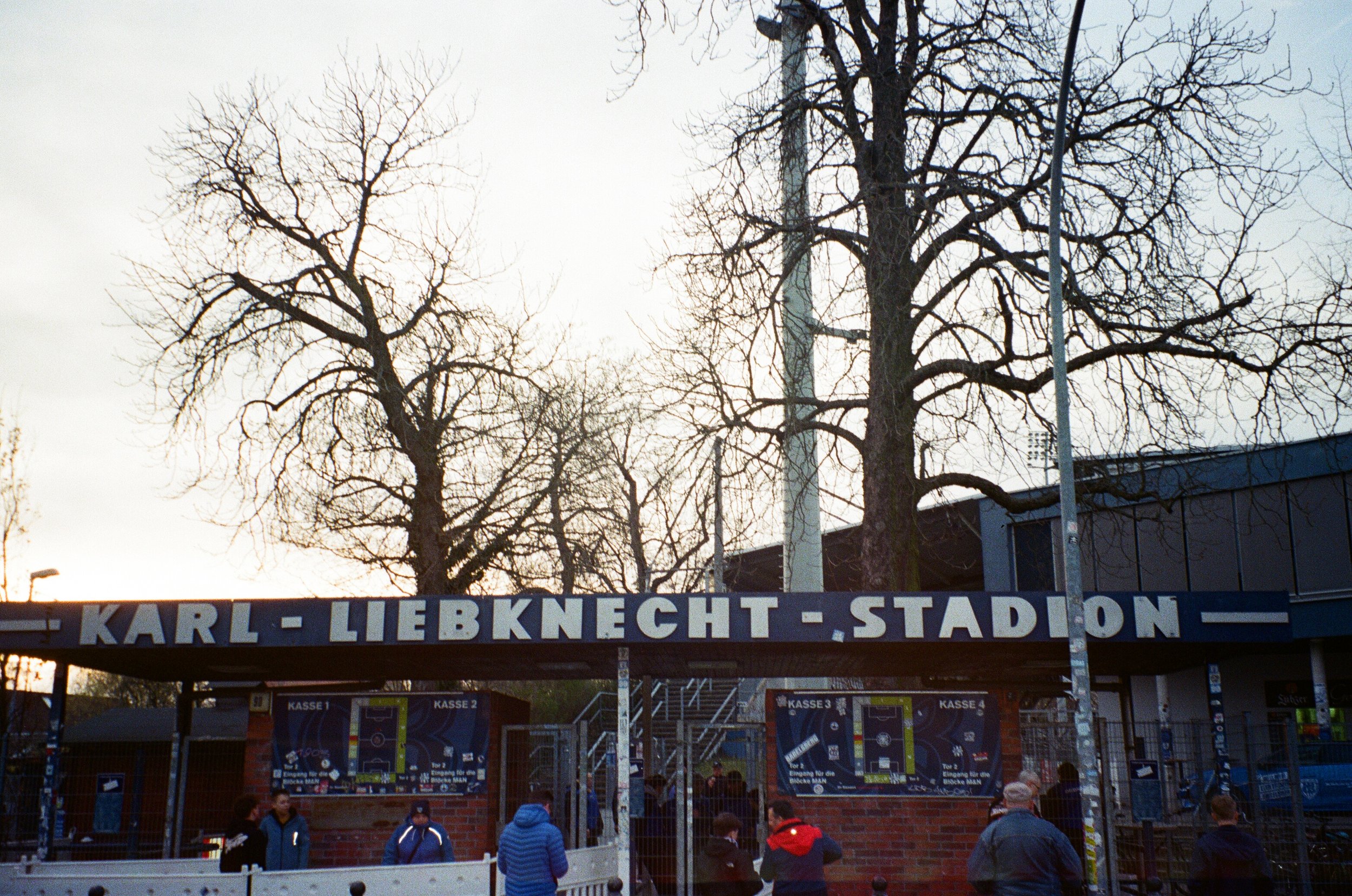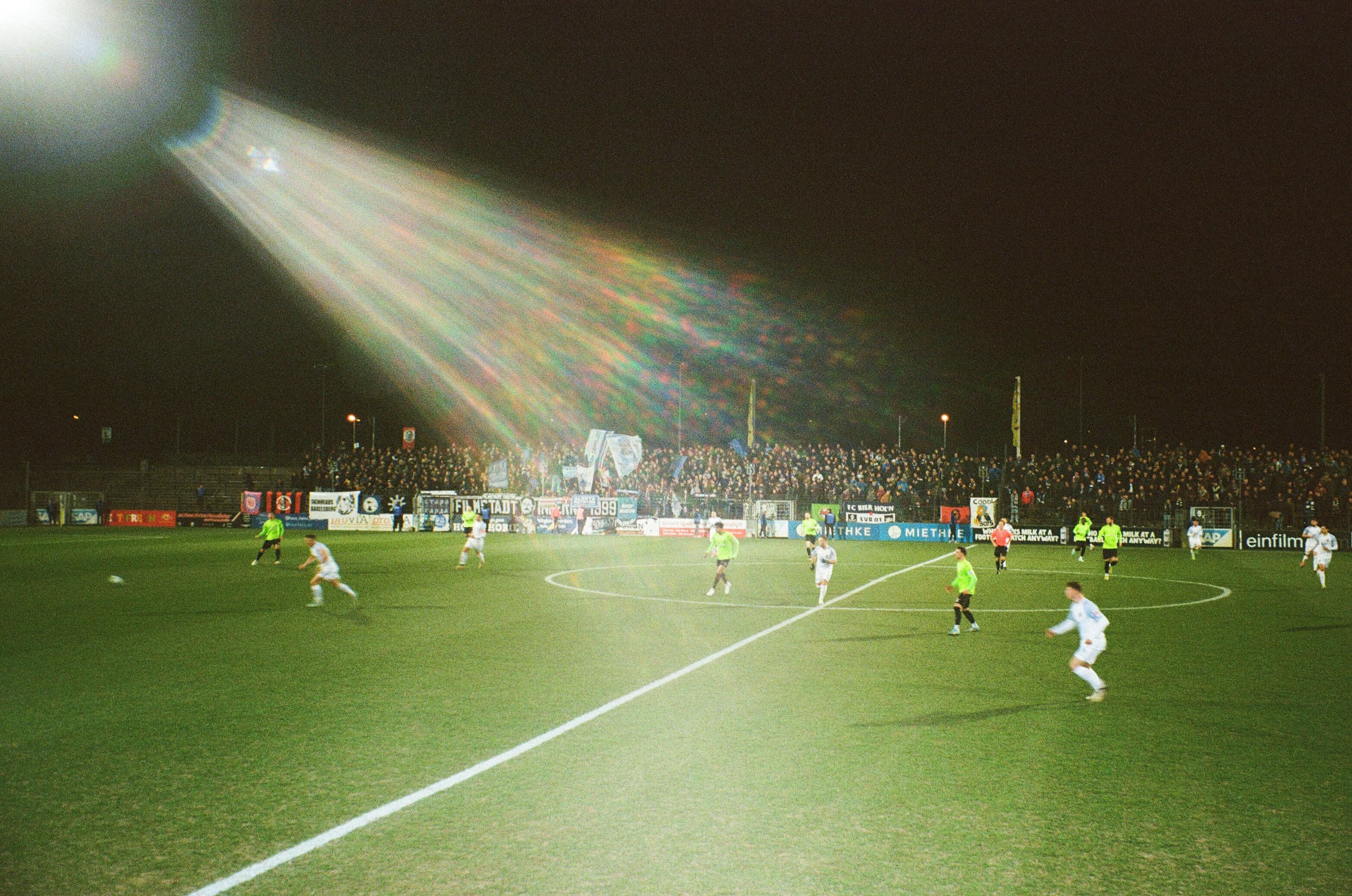Politics, Trotsky and Ska music in Babelsberg
The first thing you notice at a SV Babelsberg 03 game is the youthfulness of the crowd. The average age, at a surface level, looks younger than any football match I have ever attended. Students and young people from Potsdam and other areas in the South-Western outskirts of Berlin have long attended games here, indulging in the political tradition and welcoming atmosphere of the town. Spätis and bars up and down Karl Liebknecht Straße are packed with mostly 20-somethings heading towards the floodlights at the top of the road.
The second thing you notice, if you notice at all, is the name of the stadium: Karl Liebknecht Stadion. Liebknecht was a fervent antiwar demonstrator and member of the Social Democratic Party for Potsdam, who together with Rosa Luxemburg went on to found the Spartacus League, a Marxist revolutionary movement organised during the First World War. Talk about setting the tone. Like almost every football club in and around Berlin, SV Babelsberg 03, or simply null-drie, are happy to let their identity define them. The team in the fourth-tier of German football – the Regionalliga Nordost – are famously left leaning, anti-fascist and anti-racist.
The liveliest section of the crowd wears that reputation on its sleeve. Flags commemorating Liebknecht, Che Guevara, Trotsky and other famous revolutionary figures litter the thousand-strong Nordkurve, while various anti-fascist and anti-homophobia banners drape the advertising hoardings. Their coordinated singing and bouncing soundtracks the game.
To their right, behind the goal, stood around 250 fans of Chemnitzer FC, whose reputation was not without significance on this Tuesday night in March.
Against the backdrop of a uniquely tense political situation in Germany, particularly the schism between Berlin as the liberal outlier amidst an increasingly right-wing landscape in the east of the country, this game – like many at this level – took on added significance. I later heard from a friend after the game, who had stayed on in Babelsberg in one of the fan kniepe bars, that a small group of Chemnitzer fans had deliberately sought out trouble – engaging in street scuffles and skirmishes. Fortunately, no-one was seriously injured, and while it’s tempting to write-off encounters like this as dim-witted football tribalism, the politics of it all are too relevant to be ignored. Football terraces have long been a hotbed for the fermentation of, mostly, right-wing politics. And while counter-factions and subcultures often – if not always – emerge in opposition to it, the political leanings of the core ultra groups attached to German football clubs are something of an open secret. Now, more than ever, the politics of the terraces are all too relevant.
Three of the five states that once comprised the former GDR will hold regional elections later this year – and the far-right AfD (Alternative für Deutschland) currently lead the polls in all three. The city of Berlin finds itself again as the ballast in the east of the country – politically and socially isolated in some shape from what appear to be the general sensibilities of the surrounding states.
In January, after it was revealed that several members of the AfD and other neo-nazi groups had attended a secret meeting to discuss the idea of ‘mass deportations’, Berlin – as well as most major cities in the country – loudly and vehemently sprung into opposition and protest. Hundreds of thousands took to the streets in peaceful but affirmative demonstration, in many ways setting the tone for the political fight that seems destined to play out not only this year, but long into next year, as the nationwide general election approaches.
All of this added to the magnitude of the occasion. This was a proudly left-wing and vocally antifascist club from the capital hosting a team that not only hails from the state of Saxony, where the AfD is currently leading most pre-election polls, but a fanbase that has a notoriously influential right-wing core.
The football was a mere subplot.
It was difficult not to allow those very distinct political battlelines shape every frame of reference as we watched the action on the pitch unfold in front of us.
The first-half was fragmented and physical, with a distinct caginess to it. Babelsberg taking the lead right before half-time changed everything, as the grittiness of the first period shifted to an openness and fluidity that produced chances and flashes at both ends. The home side held out for what was clearly a satisfying 1-0 win for the 2,600 supporters watching on.
Eager not to let the feeling of a home win go to waste, the Babelsberg in-house DJ got to work. The jangly elation of Paul Simon’s “You Can Call Me Al” was up first, which had the universal effect of getting everyone out of their seat. It was followed by “King Kong”, a bouncy number from Stuttgart-founded Ska band No Sports. Another crowd pleaser. Above the press box, enjoying the sounds most of all, was the master of ceremonies and tune-selector, dancing a jig under a disco-ball. His own dancefloor.
The short walk back to the station was joyful, even as the mildness of the Spring day gave way to a bitter cold. Politics and football don’t mix, they’ll tell you. But I couldn’t shake the feeling that, for those Babelsberg fans, their politics was their football. As with all of my football experiences in Berlin, one overwhelming truth still held firm. Identity is everything.


